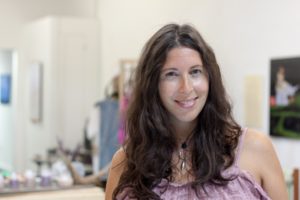Danbury’s Workspace Collective focuses on sustainability

Sustainability is the byword at Danbury”™s Workspace Collective ”” and not just because it”™s in the midst of observing its second anniversary.
“It”™s something I was always interested in,” said Meagan Neville, founder and creative director of the design and retail co-op in the Cultural Alliance of Western Connecticut building at 287 Main St. “And now I”™m in a position where I can do something about it.”
The shop features an array of fashion and lifestyle designers, ranging from artisan workshops in rural countries to designers and manufacturers in local communities and around the U.S. Each maker focuses on sustainable design, sourcing and utilizing natural fibers and fabrics, upcycled materials, and preserving cultural traditions in their design work.
“My first job was at Macy”™s, where I worked in product development,” Neville recounted. “As part of that I worked directly with factories, and my job was to get the lowest cost on jewelry.”
To realize those low costs, she said, the factories ”” many of them overseas ”” would cut their own they couldn”™t pay their workers a decent wage or properly maintain their factory upkeep, which can eventually lead to a factory collapsing.”
Such was the case in 2013, when an eight-story garment factory in Dhaka, Bangladesh, collapsed, killing 1,134 workers and injuring some 2,500 others. “That”™s when I decided that I wasn”™t satisfied with that being my job,” Neville said. “I couldn”™t be earning a paycheck by being at least partially responsible for doing that to other people.”
Having worked with a Rwandan group that was producing “really beautiful jewelry without that sort of thing happening,” she decided to start a fashion company that was dedicated to working “from a humanitarian standpoint,” she said.
Today, Workspace Collective features some 50 designers and manufacturers, all of whom are “heavily vetted,” Neville said. “We have a list of sustainability standards that they have to meet. If they fit, we can move forward.”

She noted that prospective vendors are informed of those standards ahead of time, “so that they know what they”™re getting themselves into. If they use synthetic fibers, we don”™t take them on. But if they have access to other materials and implement them, we can go ahead.”
Living up to Workspace Collective”™s ethos is important not just to its designers, but to its customers as well, she said. “They expect high-quality, sustainable products, and if we”™re not providing that, it defeats the purpose for everybody.”
That approach results in higher-priced goods, Neville noted. “Our customers understand the value of how things are made,” she said. “And a lot of time they can actually see the products being made here. They might be able to buy a kimono at another store for $20, but it”™s really not the same thing as what we have here.”
Many of the Collective”™s vendors also host workshops at the store to show how to weave fabrics, make soap and work with leather in a sustainable way, she noted.
In fact, several vendors were on hand with “pop-up tables” to demonstrate their own unique crafts during the store”™s “Buzz + Buy” anniversary event, held on Sept. 8, which also included a fashion show and “some special signature cocktails” to enjoy while shopping.
“We”™ve really built a nice range of products here,” Neville said, noting that Workspace Collective”™s inventory includes products originating from not only Danbury, Newtown and
Bethel but also from India, South Africa and several South American countries.
“Working with natural fibers like organic silk, jute and hemp ”” it really can, and does, make a difference,” she said.